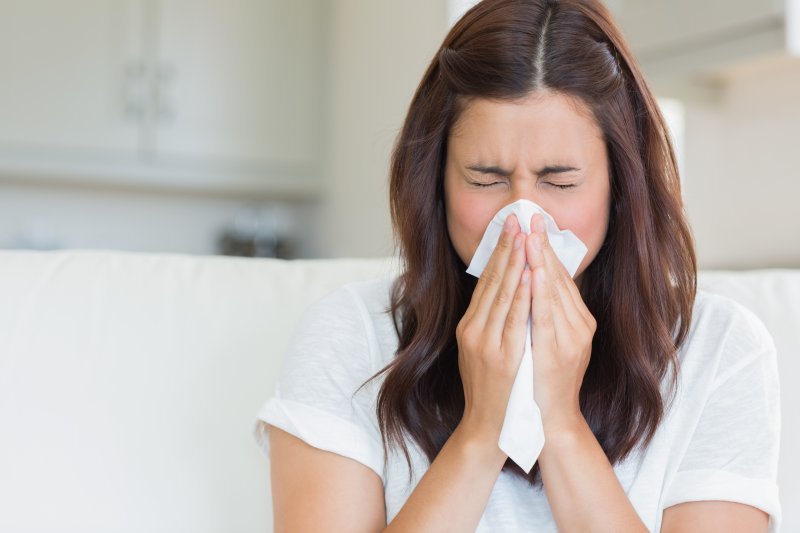
It’s that time of year again. Rain showers bring bright, blooming flowers, and flowers bring the dreaded sneeze attack. And coughing. And red eyes. And, well, the list goes on. For many, this is the reality of springtime: a long list of complications caused by a large number of allergens.
In particular, the spring impacts those who suffer from “hay fever” (a term coined to describe the cold-like symptoms brought on by spring-specific allergens). Hay fever symptoms can include:
- Congestion
- Coughing
- Sneezing
- Fatigue
- Headaches
- Itchiness, even in the throat
- Clogged ears
- Red and puffy eyes
- Inflammation of the tonsils and adenoids
- Sore throat
For those who suffer from sleep-breathing disorders like obstructive sleep apnea, this time of year can cause even more complications, as allergens tend to exacerbate snoring. Here’s how.
Allergies’ Impact on Breathing
Allergies can cause nasal congestion that makes it more difficult to breathe comfortably through the nose. This nasal congestion from seasonal allergies can cause sleep apnea sufferers to experience more frequent and longer apneas than when those symptoms are absent.
More frequent apneas are definitely something that sleep apnea sufferers want to avoid at all costs! So, how can sufferers mitigate allergy symptoms to reduce the impact on sleep-disordered breathing?
How to Soothe Allergies
There are few things you can do to reduce your reaction to allergens:
- Invest in a hypoallergenic pillow and wash/change your pillowcases often.
- Share a bed with your pet? Wipe them down, especially their paws, when they come back inside the house from being outside. You might be amazed at how many allergens can be carried by even a small animal!
- Invest in a humidifier and an air purifier. The air purifier will cleanse the air in your home of pollutants while the humidifier will add moisture to the air. Without moisture, you’re more likely to experience dryness in your nasal passages, mouth, and throat. This can impact your ability to breathe. By adding moisture in the air, you’ll help keep your airways open.
- Add allergy medications to your nightly routine and have decongestants on hand. Be sure to consult your physician before making a decision on what medications to begin taking.
- Shower or wipe yourself down after being outside for extended periods of time. Showering before bed also ensures that you aren’t bringing in any daily pollutants into bed with you.
- Consider vacuuming and dusting more consistently. Allergens can easily accumulate on carpets, rugs, and furniture.
It’s important to clarify that by treating your allergies, you are simply lessening the impact they have on your sleep breathing disorder. Treating allergies is not the same as treating your sleep apnea.
Sleep & Breathe Better This Spring
Just like with allergies, there are ways to lessen the impact that snoring and sleep apnea have on your life. Treatments like oral appliance therapy are already helping people get better rest year-round. If you continue to struggle with your sleep despite getting your allergies under control, it’s time to seek professional help. The easiest way to start on the path to a better night’s sleep and more energetic mornings is to schedule a free consultation at Sleep Better Georgia. With our help, you can actually look forward to spring this year and enjoy the warmer weather!
